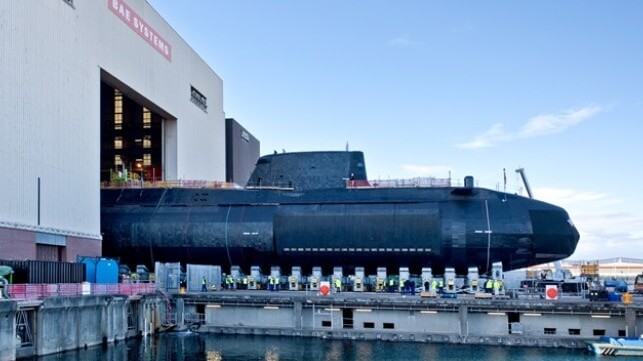BAE's Sub Workforce Problems May Foreshadow Difficulties for AUKUS

[By Samuel Garrett]
Senior officials in Australia, the United States and the United Kingdom continue to sing the praises of the AUKUS agreement. The likely passage of the US National Defense Authorization Act and approval of billions of dollars in US support, along with announcements on joint development and progress on Pillar 2 initiatives, have raised hopes among the deal’s proponents that Pillar 1—the AUKUS-class nuclear-powered submarines—will deliver the capability it promises.
Yet if the Australian government wishes to deliver Pillar 1 on time and within the already-wide budget range it has previously outlined, it must learn lessons from the troubled history of the UK’s Astute class of nuclear-powered attack submarines (SSNs). BAE Systems, the primary contractor for the Astute program, was awarded a contract to develop the AUKUS submarines in October and is likely to face challenges in developing a nuclear-capable workforce in Australia, as it did in the past in the UK.
With the AUKUS boats slated to be modelled off the Astute design and Australia having to build a workforce from a low industrial base like the UK had, Australia is at risk of repeating the mistakes of the past unless concerted efforts are made to mitigate the problems that hampered the rollout of the Astute program.
As outlined in a new report from the United States Studies Centre, the Astute program was plagued by delays and cost overruns from its inception—primarily because of poor integration and mismanagement of the shipbuilding workforce. A 17-year ’valley of death’ in submarine development at Barrow-in-Furness resulted in significant attrition of its experienced workforce, with little investment in a new generation of young talent to replace retiring workers.
The Barrow shipbuilding workforce fell from 13,000 to 3,000 between the end of the Vanguard class and the beginning of the Astute program. It therefore had significant skills shortages due to its reliance on new staff hired at the outset of the Astute program.
In addition, a small-government philosophy among the leadership of the day slashed the Ministry of Defence’s staff at Barrow from 50 during Vanguard to fewer than half a dozen. Minimal governmental oversight and coordination exacerbated the Astute program’s problems and led to poor visibility within government of the challenges facing the shipbuilding workforce. The private sector then proved ill-prepared to deal with erroneous government assumptions about the design and construction risks of the program.
Following years of delays and cost increases, the workforce issues hampering the Astute rollout began to be mitigated by greater government oversight, stakeholder communication and thorough planning of future workforce requirements. The workforce at the Barrow shipyard now numbers around 10,000 and is poised to grow to 17,000 by the decade’s end. Increases to onsite Ministry of Defence staff, the establishment of a key suppliers forum to coordinate with industry, and external workforce expertise from the US significantly boosted workforce skills, planning and management.
Key to ongoing workforce resilience has been the establishment of a £25 million skills academy in Barrow in 2018. A focus on young workers has boosted retention rates, with hundreds of apprentices having now passed through the academy. Effective integration of funded apprenticeships is likely to also be needed for the development of Pillar 1.
If Australia is to avoid the same pitfalls faced by the UK in developing a nuclear-capable workforce, it must prioritise workforce management and development as crucial to the AUKUS enterprise. Announcements of initiatives such as a skills academy in South Australia and support for university science, technology and engineering places and overseas shipbuilding placements for Australian workers are signs that the government is taking these concerns seriously.
Yet for a multi-decade program such as AUKUS, relentless attention on workforce management will be essential. Strong government leadership will be required to coordinate private-sector efforts, along with effective project and workforce management. Given the significant lead time required to recruit, train and develop a specialised industrial workforce and the enormous complexity of the engineering task they face, efforts will have to be rapidly expanded in the short term but continued in the long term.
The Australian Submarine Agency should also take care not to fully separate the design, build and operational planning teams. That was the approach taken during the Astute program, which hampered its early development due to unwieldy workforce and project management.
Mimicking the model of vocational skills training successfully employed in the UK won’t be easy. British training institutions have benefited from close relationships with employers such as BAE, but structural hurdles in Australia’s tertiary education system and limited integration between industry and tertiary education will make that hard to replicate.
In the absence of proper planning and workforce development, the strategic argument for AUKUS is likely to unravel in the face of mounting costs and delays. The risks and challenges of the Astute program were underestimated by both industry and the UK government. If Australia wishes to see AUKUS through, it can’t afford to make the same mistakes.
Samuel Garrett is a research associate at the United States Studies Centre at the University of Sydney.
This article appears courtesy of ASPI's The Strategist and may be found in its original form here.
No comments:
Post a Comment